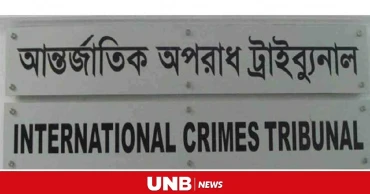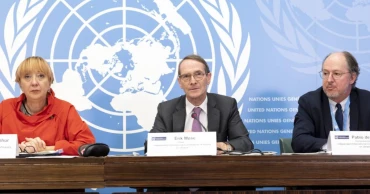War Crimes
Rights activists slam US report’s claims about Jamaat
Anti war crimes campaigners and rights activists have criticized the latest US human rights report on Bangladesh that advocated for the “freedom of assembly” of Jamaat-e-Islami – which strongly opposed the independence of Bangladesh and with the Pakistan army committed crimes against humanity during the Liberation War.
According to the US State Department report: “Leaders and members of Jamaat-e-Islami (Jamaat), the largest Muslim political party in the country, could not exercise their constitutional freedoms of speech and assembly because of harassment by law enforcement authorities. Jamaat was deregistered as a political party by the government, prohibiting candidates from seeking office under the Jamaat name.”
“This report concerns Jamaat-e-Islami (Jamaat) Bangladesh, a political party which has the proven record of collaborating with the Pakistani Military junta in 1971 in the acts of genocide, abduction, loot, arson, rape and other kinds of violence against women. It is an established fact that its military wings in the name of Al-Badr and Al-Shams were responsible for the killings of intellectuals between December 10 and 14,” noted rights activist Sultana Kamal observed.
“With due respect, I would like to submit that scanning through the media, Pakistani government communications, international reports on Bangladesh genocide of 1971, one cannot miss seeing what was the role of Jamaat during the nine months of massacre of Bangladesh… It was through a process of law that Jamaat was deregistered,” she said.
As a freedom fighter, she asked if one can imagine Nazi party being allowed to function in Germany.
Regarding the US report mentioning Bangladesh International Crimes Tribunal as “many observers viewed the proceedings as politically motivated,” the rights activist who is also a renowned lawyer said: “I have no idea on what basis the report states the war crimes trial in Bangladesh was flawed. Since I have not seen any clear explanation as to why some quarters make such remark about the war crimes trial, I prefer not to comment. However, my experience with the tribunal was that the accused’s right to self-defence was fully respected.”
Meanwhile, Ekattorer Ghatak Dalal Nirmul Committee – a group demanding the trial of war criminals and advocating for secularism in Bangladesh – has released a statement regarding the US report.
“Jamaat is still engaged in various forms of evil conspiracy against democracy and sovereignty of the country through their sponsored militant, terrorist organisations,” the statement reads.
“Jamaat is an anti-democratic fascist party which does not obey the constitution. That’s why the High Court scrapped its registration, not the government,” the Nirmul Committee statement adds.
The statement also cautions that the “untrue” claims about Jamaat in the US report could instigate “fundamentalism and terrorism” led by Jamaat.
Signatories to the statement included Justice Shamsul Huda; former Supreme Court justice AHM Shamsuddin Choudhury Manik; Barrister Shafique Ahmed; Prof Anupam Sen; cultural personality Ramendu Majumdar; noted artists Hashem Khan and Rafiqun Nabi; writer and war crimes researcher Shahriar Kabir; historian Prof Muntassir Mamoon; and writer and educationist Dr Muhammed Zafar Iqbal.
2 years ago
5 M’singh men get life sentence for war crimes
The International Crimes Tribunal (ICT) on Monday sentenced five people to life imprisonment for their crimes against humanity during the Liberation War in 1971.
The three-member tribunal led by Justice Md Shahinur Islam pronounced the judgment.
The convicts are Khandakar Golam Sabbir Ahmed, Harmuj Ali, Fakhruzzaman, Khandaker Golam Rabbani and Abdus Sattar. Among them, Fakhruzzaman and Rabbani were tried in absentia.
Lawyers Sultan Mahmud Simon, Rezia Sultana Chaman and Barrister Taposh Kanti Bol represented the state while Advocate Abdus Sobhan Tarafdar, Mizanul Islam and Haji MH Tamim stood for the accused.
Rahima Khatun, wife of martyred freedom fighter Abdur Rahman, filed a case against former Jatiya Party MP MA Hannan, Jamaat leaders Fakhruzzaman and Golam Rabbani, for their involvement in crimes against humanity during the Liberation War on May 19, 2015.
Also read: 6 sentenced to death for war crimes in Mymensingh
Investigating officer of the case Motiur Rahman, conducted the investigation from July 28, 2015 to July 11, 2016.
Police found involvement of five more people in the case and included them in the charge sheet.
On October 1, 2016, the tribunal issued warrants for the arrest of the accused.
MA Hannan, his son Rafique and three more accused were arrested from Trishal upazila in Mymensingh district. Mintu died during the trial proceedings while two other accused Fakhruzzaman and Rabbani went into hiding.
Various allegations, including mass killing, rape, confinement, abduction, torture, and arson attack on houses, were brought against them which were proved in the tribunal. They committed the crime in Trishal upazila of Mymensingh district during the Liberation War.
The tribunal took the cases against eight people into cognizance on December 11, 2016.
3 years ago
War crimes: Death-row convict Majid arrested in Madaripur
Members of Rapid Action Battalion (Rab) have arrested a war criminal and death-row convict Abdul Majid from Madaripur around four years after he was awarded capital punishment in 2019.
The 80-year-old Majid is the son of Miraj Ali of Purba Moudam village under Purbadhala police station in Netrokona, said a press release signed by Farzana Hoque, senior assistant superintendent of police (media) of Rab, on Thursday.
The fugitive convict went into hiding in 2015 when a case involving the 1971 war crimes was filed against four people including him with the International Crimes Tribunal in 2014.
He faced charges of killing, mass killing, abduction, torture, torching, rape and looting in the case.
Majid, who was the head of Razakar Bahini in Purbadhala. As a membe of the auxiliary force of the occupied Pakistani military, in collaboration with his cohort, he killed freedom fighter Abdul Khaleq and his associates at the house of Khaleq at Badha village under the Purbadhala police station on August 17, 1971.
Later, their bodies were dumped into several rivers.
Though initially four people were indicted in the case later three more people were also accused in the case.
Read more: 6 sentenced to death for war crimes in Mymensingh
The International Crimes Tribunal handed down the death sentence to all the seven accused after completing all legal procedures in 2019.
With the 36th judgment in the case, two convicts died when the case was behind bars, two died as fugitives after the judgment was passed and the other two are still at large.
3 years ago
6 sentenced to death for war crimes in Mymensingh
The International Crimes Tribunal on Monday sentenced six fugitive criminals of Mymensingh to death for their crimes against humanity during the Liberation War in 1971.
The condemned convicts are Mokhleshur Rahman Mukul, Saidur Rahman Ratan, Shamsul Haque Fakir, Nurul Haque Fakir, Sultan Mahmud Fakir and Naqib Hossain Adil Sarkar. All were tried in absentia.
Read more: Six Khulna men to die for war crimes
The tribunal headed by Justice Md Shahinur Islam handed down the punishment to the six after holding them guilty of murder, torture and kidnapping.
Public prosecutor barrister Tapas Kanti Ball represented the state in the court.
“There were total nine accused in this case. Two of them were behind the bars. Three people died, including two who were in prison and a fugitive accused, said barrister Tapas Kanti.
According to the prosecution, the investigation of this case started on January 26 in 2017. On December 31 of that year, the investigation agency submitted its report after the investigation.
Read more: Moulvibazar: Three to hang for war crimes
In July 12 in 2018, a chargesheet was submitted to the court against the convicts. Later, the trial started on December 5 of the same year through charge framing.
The testimonies of 19 people were taken in this case. At the end of arguments, the tribunal kept the case pending for judgment on December 5 last.
3 years ago
Toby Cadman, who was Jamaat's legal advisor, tells Al Jazeera he was part of team asking US, UK govts for Rab sanction
Toby Cadman, a UK lawyer who was part of the team that asked the US and UK governments for sanctions against Bangladesh’s Rapid Action Battalion (Rab), has told Al Jazeera that everyone involved was surprised when UK decided not to implement sanctions.
In a report published on December 6, 2022, Al Jazeera made the revelation.
Read more: ‘Why this US sanction on Rab?’
Incidentally, Bangladesh Jamaat-e-Islami engaged Toby Cadman as its legal advisor in London in 2011, after the trials of several top Jamaat leaders started – over war crimes committed during the 1971 Liberation War.
The media was informed at the time by Tajul Islam – attorney for five Jamaat leaders – that Steven Kay QC, Toby Cadman, and John Cammegh had agreed to represent the Jamaat leaders.
Cadman was quoted by Al Jazeera as saying, “I filed the request for sanctions and whilst I am not in a position to discuss the substance, I can confirm that I discussed the request with the Foreign, Commonwealth & Development Office [FCDO, UK].”
“Having worked on both the US and UK request for sanctions, I was strongly of the view that a coordinated response was necessary in the circumstances… Our filing in the UK targeted political officials and those in the security sector,” Cadman said.
He went on to say: “It was certainly my position that the UK would issue mirror sanctions in coordination with the US. I was extremely disappointed when they failed to do so.”
Mohammad Ashrafuzzaman, a liaison officer at the Asian Human Rights Commission who submitted the proof of human rights violations by Rab attached to the sanctions petitions to the US and the UK, echoed Cadman’s dismay, according to the Al Jazeera report.
Read more: US imposes sanctions on RAB, 7 individuals
Ashrafuzzaman pointed out that the US utilised the evidence his team gathered to justify the sanctions against Rab.
Ashrafuzzaman told Al Jazeera: “The evidence was sent to the US state department and treasury, it was used by the US. That evidence was sent to the UK as well.”
Asian Human Rights Commission, in a statement released in October, alleged that “the pro-government media and the internal and external allies of the Government of Bangladesh are running a smear campaign against the UN Independent Experts, specially the Working Group on Enforced or Involuntary Disappearances (WGEID) for their consistent attention to address the issue of enforced disappearance.”
Responding to that, Professor Dr Mizanur Rahman, former Chairman of National Human Rights Commission, wrote: “What the (Asian Human Rights) Commission, however, failed to consider is that it was not an attempt to vilify any human rights body, rather the intention was to simply pinpoint the inconsistency and inaccuracy of the data coming from an institution like the UN which has always been at the forefront of defending human rights across the globe.”
Read more: US sanctions on RAB made BNP fearless in anti-government protests: Fakhrul
BNP Secretary General Mirza Fakhrul Islam Alamgir, in an interview published last month, had said the US sanctions on Rab helped rejuvenate the BNP rank and file to take to the streets fearlessly, as reflected in its recent rallies.
3 years ago
UN rights experts find war crimes evidence against Russia in Ukraine
A team of experts commissioned by the U.N.’s top human rights body to look into rights violations in Ukraine said Friday its initial investigation turned up evidence of war crimes in the country following Russia’s invasion nearly seven months ago.
The experts from the Commission of Inquiry on Ukraine, mandated by Human Rights Council earlier this year, have so far focused on four regions – Kyiv, Chernihiv, Kharkiv and Sumy.
Presenting their most extensive findings so far, they cited testimonies by former detainees of beatings, electric shocks and forced nudity in Russian detention facilities, and expressed grave concerns about executions the team was working to document in the four regions.
“Based on the evidence gathered by the commission, it has concluded that war crimes have been committed in Ukraine,” Erik Mose, the commission’s chairman, told the Human Rights Council.
Commission member Pablo de Greiff told reporters the team had “found two instances of ill-treatment of Russian Federation soldiers by Ukrainian soldiers. ... We have found obviously significantly larger numbers of incidences that amount to war crimes on the part of the Russian Federation.”
During a 10-day June trip to Ukraine, the team visited Bucha, a city outside Kyiv where Ukrainian authorities found mass graves and bodies strewn in the streets after Russian forces pulled out in late March.
“We were struck by the large number of executions in the areas that we visited. The commission is currently investigating such deaths in 16 towns and settlements,” Mose said. He didn’t specify who or which side in the war allegedly committed the killings.
The findings echo reports by news outlets and others of the destruction, death and despair in Ukraine since Russian President Vladimir Putin ordered the invasion on Feb. 24.
The commission’s work could ultimately contribute to the work of International Criminal Court prosecutors who could bring charges over war crimes in Ukraine, although it remains uncertain whether Russia or other alleged perpetrators will ever face justice.
Read: ICC prosecutor to open probe into war crimes in Ukraine
Anton Korynevych, ambassador-at-large for Ukraine’s Foreign Ministry, joined envoys from a number of Western countries who spoke out against Moscow’s war in the wake of the commission’s presentation. Russia’s delegation boycotted the council meeting.
Korynevych, speaking by video, called for the creation of a special tribunal that would have jurisdiction “over the crime of aggression against Ukraine” and investigate senior Russian political and military leaders who were allegedly responsible.
He said said accountability was crucial for rights violations and atrocities linked to Russia’s “aggression.” But Korynevych also highlighted how the war’s impact has rippled through the world and “put numerous countries on the verge of hunger, exacerbated extreme poverty, created the threat of nuclear catastrophe unseen before” and harmed the livelihoods of millions of people.
Commission investigators visited 27 towns and settlements, as well as graves and detention and torture centers; interviewed more than 150 victims and witnesses; and met with advocacy groups and government officials, Mose said.
He said an unspecified number of Russian soldiers were found to have committed crimes of sexual or gender-based violence – with victims ranging in age from 4 to 82 years old.
The commission plans to gradually expand its investigation, with areas of interest including allegations of filtration camps for people being detained or deported, the forced transfer of people, and allegations of expedited adoption of children.
“The evidence of Russia’s atrocities becomes more horrifying by the day, most recently with the uncovering of mass graves in Izium, where the bodies show signs of torture,” Michele Taylor, the U.S. ambassador to the rights council, said, referring to a Kharkiv regional city that Ukrainian forces recaptured in recent weeks.
Read: Ukraine alleges torture at village near Russian border
Taylor urged the commissioners to continue to “examine the growing evidence of Russia’s filtration operations, forced deportations and disappearances.”
She referred to “numerous sources” that indicated Russian authorities have interrogated, detained and/or forcibly deported between 900,000 and 1.6 million Ukrainian citizens, and reports that children were being deported from Ukraine and placed in Russian orphanages for adoption.
A handful of Russia’s allies took to the defense of Moscow.
Ina Vasileuskaya, the deputy permanent representative of Belarus to the U.N. in Geneva, said Russia’s invasion aim was to protect Russian speakers in Ukraine.
“Biased discussions in the Human Rights Council only accusing Russia are a dead end,” she said.
Vasileuskaya said her country was not a party to the conflict, although Belarus was one of the places Russian forces gathered before invading Ukraine.
3 years ago
Moulvibazar: Three to hang for war crimes
The International Crimes Tribunal in Moulvibazar on Thursday sentenced three men to death for their involvement in crimes against humanity during the 1971 Liberation War.
The three-member Tribunal, led by Justice Md Shahinur Islam, handed down the punishment to Abdul Aziz alias Habul, Abdul Mannan alias Monai and Abdul Matin, after holding them guilty of murder, rape, looting, arson, torture and kidnapping. Of them, Matin was tried in absentia.
Also read: Dhaka urges London to repatriate convicted war criminals
Lawyers M Sarwar Hossain and Abdus Sattar Paloyan appeared for the convicts, all residents of the district, while prosecutors Muklesur Rahman Badal and Sabina Yasmin Khan Munni represented the state.
According to the prosecution, the investigation agency of the tribunal started a probe against the three convicts on October 16 in 2014.
On November 14 in 2016, the investigation was completed. On February 29 of that year, the tribunal issued arrest warrants against the three.
Also read: 6 war crimes suspects held in Jashore
Police arrested Abdul Mannan and Abdul Aziz on March 1 of the same year. On the following day, the two were produced before the Tribunal and sent to judicial custody.
In November 2016, the tribunal's investigating agency submitted the chargesheet against the three accused. On May 15 of the year, the tribunal framed charges against them and started the trial.
3 years ago
Neighbors back Ukraine, demand accountability for war crimes
The presidents of four countries on Russia’s doorstep toured war-ravaged areas near the Ukrainian capital and demanded accountability for what they called war crimes, as Kyiv and Moscow gave conflicting accounts of what happened to a badly damaged missile cruiser that is the flagship vessel of Russia’s fleet in the Black Sea.
Wednesday’s visit by the leaders of Poland, Lithuania, Latvia and Estonia was a strong show of solidarity from the countries on NATO’s eastern flank, three of them like Ukraine once part of the Soviet Union. They traveled by train to the Ukrainian capital, Kyiv, to meet with their counterpart, Volodymyr Zelenskyy, and visited Borodyanka, one of the nearby towns where evidence of atrocities was found after Russian troops withdrew to focus on the country’s east.
“The fight for Europe’s future is happening here,” Lithuanian President Gitanas Nauseda said, calling for tougher sanctions, including against Russian oil and gas shipments and all the country’s banks.
Elsewhere, in one of the most crucial battles of the war, Russia said more than 1,000 Ukrainian troops had surrendered in the besieged southern port city of Mariupol, where Ukrainian forces have been holding out in pockets of the city. A Ukrainian official denied the claim, which could not be independently verified.
And in the Odesa region, Gov. Maksym Marchenko said Ukrainian forces struck the guided-missile cruiser Moskva — the flagship of Russia’s Black Sea Fleet — with two missiles and caused “serious damage.” Russia’s Defense Ministry confirmed the ship was damaged but not that it was hit by Ukraine — it said ammunition on board detonated as a result of a fire of as-yet undetermined causes. The entire crew was evacuated, it added; the cruiser typically has about 500 on board.
Russia invaded on Feb. 24 with the goal, according to Western officials, of taking Kyiv, toppling the government and installing a Moscow-friendly one. But the ground advance slowly stalled and Russia lost potentially thousands of fighters. The conflict has killed untold numbers of Ukrainian civilians and forced millions more to flee. It also has rattled the world economy, threatened global food supplies and shattered Europe’s post-Cold War balance.
A U.N. task force warned on Wednesday that the war threatens to devastate the economies of many developing countries that are facing even higher food and energy costs and increasingly difficult financial conditions. U.N. Secretary-General Antonio Guterres said the war is “supercharging” a crisis in food, energy and finance in poorer countries that were already struggling to deal with the COVID-19 pandemic, climate change and a lack of access to funding.
A day after he called Russia’s actions in Ukraine “a genocide,” U.S. President Joe Biden approved $800 million in new military assistance to Kyiv, saying weapons from the West have sustained Ukraine’s fight so far and “we cannot rest now.” The munitions include artillery systems, armored personnel carriers and helicopters.
Appearing alongside Zelenskyy in an ornate room in Kyiv’s historic Mariinskyi Palace, Nauseda, Estonian President Alar Karis, Poland’s Andrzej Duda and Latvia’s Egils Levits reiterated their commitment to supporting Ukraine politically and with military aid.
“We know this history. We know what Russian occupation means. We know what Russian terrorism means,” Duda said. He added that both those who committed war crimes and those who gave the orders should be held accountable.
“If someone sends aircraft, if someone sends troops to shell residential districts, kill civilians, murder them, this is not war,” he said. “This is cruelty, this is banditry, this is terrorism.”
In his daily late-night address, Zelenskyy noted that the prosecutor of the International Criminal Court visited the Kyiv suburb of Bucha, which was controlled by Russian forces until recently and where evidence of mass killings and more than 400 bodies were found.
“It is inevitable that the Russian troops will be held responsible. We will drag everyone to a tribunal, and not only for what was done in Bucha,” Zelenskyy said late Wednesday.
He also said work was continuing to clear tens of thousands of unexploded shells, mines and trip wires left behind in northern Ukraine by the departing Russians. He urged people returning to homes to be wary of any unfamiliar objects and report them to police.
Read: ‘It’s not the end’: The children who survived Bucha’s horror
Also Wednesday, a report commissioned by the Organization for Security and Cooperation in Europe found “clear patterns of (international humanitarian law) violations by the Russian forces in their conduct of hostilities.” It was written by experts selected by Ukraine and published by the Vienna-based organization, which promotes security and human rights.
The report said there were also violations by Ukraine, but concluded those committed by Russia “are by far larger in scale and nature.”
Residents in Yahidne, a village near the northern city of Chernihiv, said Russian troops forced them to stay for almost a month in the basement of a school, allowing them outside only to go to the toilet, cook on open fires — and bury the dead in a mass grave.
In one of the rooms, they kept a list of those who perished. It had 18 names.
“An old man died near me and then his wife died next,” Valentyna Saroyan said. “Then a man died who was lying there, then a woman sitting next to me. ... Another old man looked so healthy, he was doing exercises, but then he was sitting and fell. That was it.”
Read: More than 10,000 civilians dead in Ukraine port city: Mayor
Russian President Vladimir Putin has denied his troops committed atrocities, saying Tuesday that Moscow “had no other choice” but to invade and would “continue until its full completion and the fulfillment of the tasks that have been set.” He insisted Russia’s campaign was going as planned despite a major withdrawal after its forces failed to take the capital and suffered significant losses.
Russian troops are now gearing up for a major offensive in the eastern Donbas region, where Moscow-allied separatists and Ukrainian forces have been fighting since 2014.
A key piece of the Russian campaign is Mariupol, which lies in the Donbas and which the Russians have pummeled for weeks.
Russian Defense Ministry spokesman Maj.-Gen. Igor Konashenkov said 1,026 troops from the Ukrainian 36th Marine Brigade surrendered at a metals factory in the city. But Vadym Denysenko, adviser to Ukraine’s interior minister, rejected the claim, telling Current Time TV that “the battle over the seaport is still ongoing today.”
It was unclear when a surrender may have occurred or how many forces were still defending Mariupol.
According to the BBC, Aiden Aslin, a British man fighting in the Ukrainian military in Mariupol, called his mother and a friend to say he and his comrades were out of food, ammunition and other supplies and would surrender.
Russian state television broadcast footage Wednesday that it said was from Mariupol showing dozens of men in camouflage walking with their hands up and carrying others on stretchers or in chair holds. One man held a white flag. In the background was a tall industrial building with its windows shattered and roof missing, identified by the broadcaster as the Iliich metalworks.
3 years ago
War crimes, crimes against humanity committed daily in Myanmar: UN expert
War crimes and crimes against humanity are being committed every day with impunity by the military junta of Myanmar, Tom Andrews, the Special Rapporteur on the situation of human rights in Myanmar, told the Human Rights Council in Geneva Monday.
"The people of Myanmar have been told that the world has a 'responsibility to protect,' victims of atrocity crimes, including crimes against humanity and war crimes. As the military junta escalates its ruthless attacks on the people of Myanmar, the people of Myanmar see only endless expressions of concern from the international community, vague declarations that something should be done and a tedious, endless wait for a consensus to act," he said.
"For nearly 14 months, this body [the Human Rights Council] and other UN bodies have held meetings, issued statements and passed non-binding resolutions. Some member states have sanctioned individuals and entities linked to the Myanmar military junta."
For the people of Myanmar, these are welcome but insufficient steps to hold to account those responsible for relentless attacks on them that continue at this very moment, Andrews added.
He pointed to international action in light of the crisis in Ukraine as a standard by which its response to the crisis in Myanmar can be measured:
"Those responsible for the attacks against the people of Ukraine faced severe targeted sanctions personally, and their country's central bank was sanctioned even as foreign currency reserves were frozen," Andrews said.
READ: ICC prosecutor launches Ukraine war crimes investigation
"In the space of four days, the member states of the United Nations summoned the political will to take tangible action."
Andrews said the military junta had murdered more than 1,600 civilians, detained more than 10,000, displaced more than half a million, destroyed more than 4,500 homes since the start of this year, spread armed conflict to regions previously at peace, and continued to systematically oppress and persecute the Rohingyas in Rakhine State.
"It is clear to me that the generals responsible for these escalating horrors are guilty of crimes against humanity, including the crimes of murder, enslavement, displacement and forcible transfer, enforced disappearance, torture, rape and sexual violence," Andrews said.
"I also believe that junta forces have committed war crimes including willful killing, destruction of property, torture and inhumane treatment, pillaging, rape, and displacement of civilians."
In a report to the Council, Andrews highlighted the cost of the junta's attacks on the people of Myanmar: "The military junta has driven Myanmar into a humanitarian catastrophe marked by a crumbling health infrastructure, half the nation falling into poverty, rampant inflation, and the cruel and outrageous blocking of the delivery of aid to those in desperate need."
"Children are being targeted and killed even as they run with their parents for safety. More than 100 have been murdered since the coup was launched last year. More than 100 children are gone, victims of the military junta's ruthlessness, brutality, and cowardice," the UN expert said.
"As members of this Human Rights Council, a body that can serve as the conscience of the United Nations, I hope that most, if not all, of you are horrified and outraged as well."
Andrews added that nearly one million children have missed routine immunisations, which alone could result in the deaths of 33,000 children this year.
He urged the Council and its member states to "stand with and for the people of Myanmar with not only words but even more importantly, with action" as for growing numbers of men, women and children in Myanmar, it is a matter of life and death.
3 years ago
6 war crimes suspects held in Jashore
Police have arrested six people from Bagherpara upazila in Jashore for their suspected involvement in the crimes against humanity during the Liberation War in 1971.
The arrestees are Abul Hossain Biswas, Hossain Ali, Abu Bakkar, Lutfar Rahman, Khoibar Rahman and Nur Islam, of Bagherpara upazila.
Read:2 war crimes suspects held in Jashore -
Later, they were handed over to the International Crimes Tribunal, said Bagharpara Police Station Officer-in-Charge Firoz Uddin said on Tuesday.
On Sunday, a team led by DB OC Rupon Sarkar and Bagharpara Police Station OC Firoz Uddin arrested the six war crimes suspects from different parts of the upazila.
On Saturday, Jashore district police received the arrest warrant.
A case was filed against the six in 2017. After an investigation, the tribunal issued an warrant for their arrest on October 21 this year.
4 years ago







.jpg)








